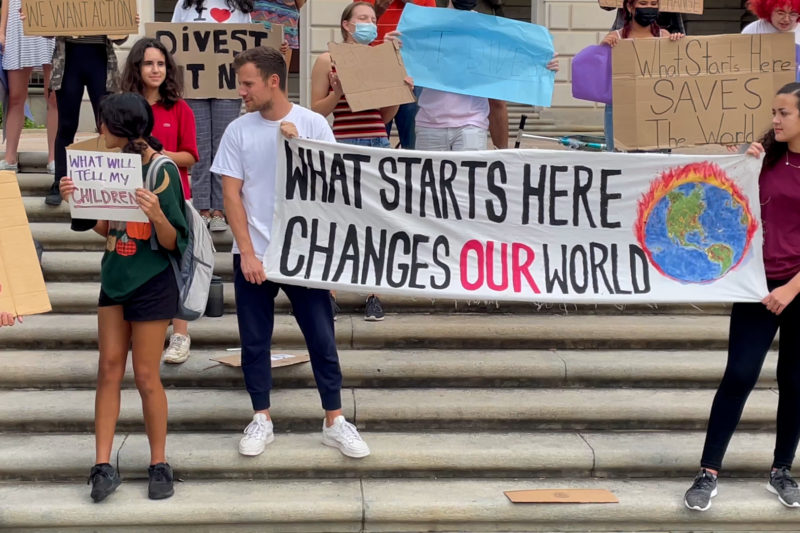Students Protest UT’s Contribution to Climate Change
By Cassidy Ellison
Reporting Texas TV
AUSTIN, Texas – Climate change is a hot topic for some students at the University of Texas at Austin, prompting one organization to visit the office of the university’s president to voice its concerns over climate change.
Students Fighting Climate Change (SFCC) continues to try to meet with President Jay Hartzell. The group had a meeting scheduled for October 26, but it was canceled two days prior.
“We felt that it was a very disrespectful thing to do and way to do it,” SFCC media director Hazel Kent said.
In response to the meeting’s cancellation, SFCC had over 30 students protested in front of and inside the Tower. SFCC wants UT to stop investing in oil companies like Shell and Saudi Aramco, and instead switch to renewable energy sources including solar and wind power.
“In the meeting with the president, we weren’t going to talk specifically about divestment because it’s such a difficult issue to talk about,” Edwin Grove said.
“Everyone in the university establishment is opposed to it because it makes so much money.”
In the meeting, the group planned on presenting its five-action equity plan for the university, which works to initiate the conversations around climate change. The university has not made a public statement on the climate crisis or climate change in an official capacity.
“That’s a really big deal because most universities around the world have made public acknowledgments of the climate crisis and said they’re trying to work towards dealing with it,” Grove said.

Students Fighting Climate Change on campus protested in front of the Tower in response to the group’s meeting with President Jay Hartzell getting canceled last minute. (Photo: Cassidy Ellison)
The UT system has an endowment of over $30 billion according to its website.
Around $10 billion comes from investments in oil companies. That funding is then used for long-term funding for things such as student scholarships, faculty support and research.
Scott Broekstra, an Texas environmental lawyer, said, the transition away from oil and gas will not be a short process. It will likely take over ten years.
“I’m sure that there are universities in other states that aren’t so dependent on fossil fuels for their economy that are divesting more rapidly,” Broekstra said.
SFCC was not told why it was taken off the agenda to meet with President Hartzell last week, and have not been given a new date. The group doesn’t plan to let this set it back in its agenda.
“We are going to pursue meeting with pretty much anyone we can. [Student body president] Kiara [Kabbara] said it was possible we could meet with [Dean Lilly so we are trying to follow up with that,” Kent said.
Grove said getting an education means more than just receiving a piece of paper at the end of schooling. For him, it means learning about issues that matter and acting on them. In this case, that looks like protesting.
“This is what democracy looks like. This is how you get things done. You have to try. You can’t be complacent,” Grove said.